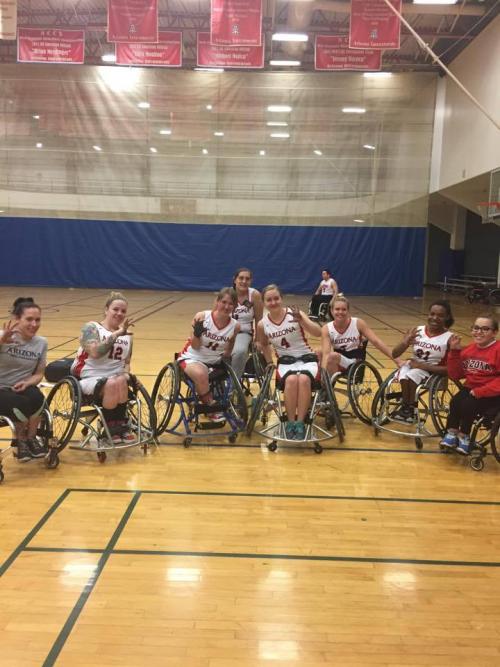
For those of you who have been reading my blogs on a regular basis you know that I moved to Tucson in order to be an Assistant Coach for the Women’s Wheelchair Basketball Team at the University of Arizona. My passion for coaching wheelchair basketball grew out of my experiences of volunteering through VSO with the National Trust, Ministry of Social Justice and Empowerment, Government of India, and meeting board members from Wheelchair Athletes Worldwide (WAW) in New Delhi where we did a project in November 2011. My passion became stronger when I moved to Nepal in June 2012, helped to coach the Nepal Army Wheelchair Basketball Team, did another project with WAW in Kathmandu in May 2013, and then became part of the very first wheelchair basketball league in Nepal, the Turkish Airlines ENGAGE Empowering League. When my friend Pete Hughes, head coach of the University Women’s Wheelchair Basketball Team said that I could work and learn from him, there was no hesitation in moving back to the US. (There also was the issue of ageing parents and wanting to be closer to them, something I learned more about from living for 7+ years in India and Nepal).
My very first season of coaching recently ended with me actually being the head coach on our last weekend for one game with the Women’s Team and one as coach of the community basketball team, the Tucson Lobos (white) team.
But how did I get to this point after a five-month season, a number of road trips, and many learnings. Given that I worked primarily with the women’s team and also that we are celebrating International Women’s Day (IWD) with the theme of Be Bold for Change, it’s appropriate to talk about the young women that I worked with. This year’s IWD campaign asked how we will all Be Bold for Change in the following areas: challenging bias and inequality, campaigning against violence, forging women’s advancement, celebrating women’s achievement and championing women’s education.
As I think about this past season, I experienced how these young women are challenging bias and inequality just by being themselves, how they are forging women’s advancement, competing on many levels and championing women’s education. These young women are obtaining their Bachelor’s and Master’s degrees, want to be doctors and counselors, and working as professionals. The other Assistant Coach on the University of Arizona team was Jenn Poist who is a Paralympian and works as a pharmacist. These women live with a physical disability everyday but I see them as no different than anyone else in American society. Can you imagine this in Nepal, i.e. women with disability or for that matter women in general, having much more equality in society?
As I witnessed on our numerous road trips, these young women don’t let anything stop them getting on and off airplanes in their wheelchairs, pushing through airports in order to make connecting flights, dealing with people with unbelieving looks on their faces and just being “college aged “kids”. I think back to the times in Nepal where many people would look through the fence surrounding the Army base where the Nepal Army Wheelchair Basketball Team practiced. They just couldn’t believe their eyes.
It took so much to make this season happen, so many partnerships with many other universities, with the National Wheelchair Basketball Association (NWBA); the Disability Resource Center at the University of Arizona promoting sports for persons with disability, students, as well as community members. We also raised $1,000 for the ALS Association of Arizona by having people donate a certain amount of money for each point scored in our last game. Women becoming equal to men on all fronts will not occur unless we all continue to Be Bold for Change.










Add new comment